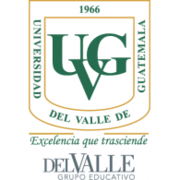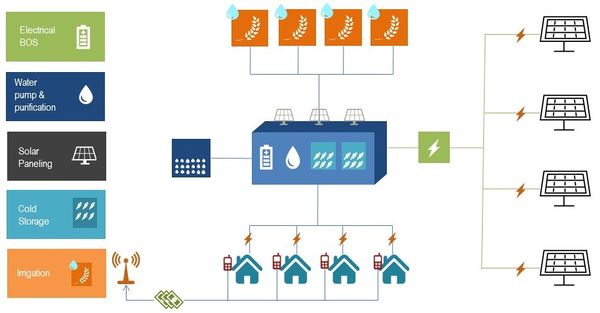Click here to register!
Difference between revisions of "Private Sector Financed Community Solar Microgrids and Agricultural Accelerators"
***** (***** | *****) |
***** (***** | *****) |
||
| Line 1: | Line 1: | ||
| − | |||
= Overview<br/> = | = Overview<br/> = | ||
| Line 6: | Line 5: | ||
|- | |- | ||
| style="width: 25%;" | | | style="width: 25%;" | | ||
| − | Innovator | + | Innovator<br/> |
| style="width: 50%;" | | | style="width: 50%;" | | ||
| Line 39: | Line 38: | ||
Small-scale producers from low-income agricultural communities Guatemala are among the most vulnerable actors in agricultural value-chains across the country. Suitable technologies, including irrigation systems and [[Cold Storage of Agricultural Products|cold storage]] facilities, are readily available in Guatemala, however, there are three main constraints preventing producers from accessing them: lack of affordable clean energy to power facilities; lack of affordable finance for investment in clean energy power generation; and lack of skilled service providers who can sustainably operate services at a price-point affordable to producers.<ref name="Powering Agriculture: http://poweringag.org/innovators/private-sector-financed-community-solar-microgrids-agricultural-accelerators">Powering Agriculture: http://poweringag.org/innovators/private-sector-financed-community-solar-microgrids-agricultural-accelerators</ref> | Small-scale producers from low-income agricultural communities Guatemala are among the most vulnerable actors in agricultural value-chains across the country. Suitable technologies, including irrigation systems and [[Cold Storage of Agricultural Products|cold storage]] facilities, are readily available in Guatemala, however, there are three main constraints preventing producers from accessing them: lack of affordable clean energy to power facilities; lack of affordable finance for investment in clean energy power generation; and lack of skilled service providers who can sustainably operate services at a price-point affordable to producers.<ref name="Powering Agriculture: http://poweringag.org/innovators/private-sector-financed-community-solar-microgrids-agricultural-accelerators">Powering Agriculture: http://poweringag.org/innovators/private-sector-financed-community-solar-microgrids-agricultural-accelerators</ref> | ||
| − | + | <br/> | |
| + | <br/> | ||
= Clean Energy Solution<br/> = | = Clean Energy Solution<br/> = | ||
| − | UVG uses an innovative approach to developing low-cost community utility companies in ‘off-grid’ agricultural communities called Community Accelerators. Each Accelerator will consist of a localized [[ | + | UVG uses an innovative approach to developing low-cost community utility companies in ‘off-grid’ agricultural communities called Community Accelerators. Each Accelerator will consist of a localized [[Photovoltaic (PV)|photovoltaic]] (PV) mini-grid and will be operated by a local for-profit service provider company that also provides agribusiness service. This “utility in a box” approach is designed so that private sector financing can be used to fund the establishment of Accelerators, making this clean energy solution scalable without additional donor funding.<ref name="Powering Agriculture: http://poweringag.org/innovators/private-sector-financed-community-solar-microgrids-agricultural-accelerators">Powering Agriculture: http://poweringag.org/innovators/private-sector-financed-community-solar-microgrids-agricultural-accelerators</ref><br/> |
<p style="text-align: center;">{{#widget:YouTube|id=pxLourrX6kY|height=400|width=800}}<br/></p> | <p style="text-align: center;">{{#widget:YouTube|id=pxLourrX6kY|height=400|width=800}}<br/></p> | ||
| − | + | <br/> | |
= Impact = | = Impact = | ||
| Line 52: | Line 52: | ||
The project will provide access to clean energy to operate irrigation systems and cold storage facilities. Micro-financing will allow operators to provide services at an affordable price, while generating enough revenue to remain profitable year-round. Increasing the availability of clean energy in communities will reduce reliance on carbon-based fuels currently used to power generators, kerosene lamps, etc. Deforestation may also be reduced as the CES provides an alternative to wood-fueled fires used to dry cardamom.<ref name="Powering Agriculture: http://poweringag.org/innovators/private-sector-financed-community-solar-microgrids-agricultural-accelerators">Powering Agriculture: http://poweringag.org/innovators/private-sector-financed-community-solar-microgrids-agricultural-accelerators</ref> | The project will provide access to clean energy to operate irrigation systems and cold storage facilities. Micro-financing will allow operators to provide services at an affordable price, while generating enough revenue to remain profitable year-round. Increasing the availability of clean energy in communities will reduce reliance on carbon-based fuels currently used to power generators, kerosene lamps, etc. Deforestation may also be reduced as the CES provides an alternative to wood-fueled fires used to dry cardamom.<ref name="Powering Agriculture: http://poweringag.org/innovators/private-sector-financed-community-solar-microgrids-agricultural-accelerators">Powering Agriculture: http://poweringag.org/innovators/private-sector-financed-community-solar-microgrids-agricultural-accelerators</ref> | ||
<p style="text-align: center;">[[File:UVG-Accelerator-Diagram.jpg|thumb|center|600px|UVG Accelerator Diagram © Powering Agriculture]]</p> | <p style="text-align: center;">[[File:UVG-Accelerator-Diagram.jpg|thumb|center|600px|UVG Accelerator Diagram © Powering Agriculture]]</p> | ||
| + | = Organization<br/> = | ||
| − | = | + | The Universidad del Valle de Guatemala (University of the Valley of Guatemala (UVG)) is a private, not-for-profit, secular university located in Guatemala City, Guatemala. Founded in 1966 by a private foundation, it was the first private university in Guatemala to give a strong emphasis to technology. UVG has partnered with Development Ventures and Greenergyze, S.A. Development Ventures will serve as the technical lead on financial infrastructure activities. Greenergyze will lead the physical infrastructure activities.<ref name="Powering Agriculture: http://poweringag.org/innovators/private-sector-financed-community-solar-microgrids-agricultural-accelerators">Powering Agriculture: http://poweringag.org/innovators/private-sector-financed-community-solar-microgrids-agricultural-accelerators</ref><br/> |
| − | + | = Progress Update<br/> = | |
| + | The project team has analyzed over 100 potential pilot sites and is now in the final stages of the defined engagement process with four selected potential pilot sites. The team is aiming to complete agreements with two communities to finalize the investments. The project has also succeeded in sourcing two Guatemala-based impact investors and is in the process of completing the legal requirements for the investments to proceed.<ref name="Powering Agriculture: http://poweringag.org/innovators/private-sector-financed-community-solar-microgrids-agricultural-accelerators">Powering Agriculture: http://poweringag.org/innovators/private-sector-financed-community-solar-microgrids-agricultural-accelerators</ref><br/> | ||
| + | |||
| + | <br/> | ||
= Further Information<br/> = | = Further Information<br/> = | ||
| − | *[[Portal: | + | *[[Portal:Powering Agriculture|Powering Agriculture Portal on energypedia]]<br/> |
*[http://poweringag.org/innovators Powering Agriculture Homepage, Winners/ Innovators]<br/> | *[http://poweringag.org/innovators Powering Agriculture Homepage, Winners/ Innovators]<br/> | ||
| − | *[[ | + | *[[Powering Agriculture: An Energy Grand Challenge for Development|Powering Agriculture: An Energy Grand Challenge for Development]]<br/> |
*[https://poweringag.org/news-events/program-updates/newsletters Powering Agriculture Newsletters]<br/> | *[https://poweringag.org/news-events/program-updates/newsletters Powering Agriculture Newsletters]<br/> | ||
*Website [http://www.uvg.edu.gt/ Universidad del Valle de Guatemala]<br/> | *Website [http://www.uvg.edu.gt/ Universidad del Valle de Guatemala]<br/> | ||
| Line 68: | Line 72: | ||
*Website [http://www.greenergyze.com/ Greenergyze S.A.]<br/> | *Website [http://www.greenergyze.com/ Greenergyze S.A.]<br/> | ||
| + | <br/> | ||
= References = | = References = | ||
| Line 73: | Line 78: | ||
<references /> | <references /> | ||
| + | [[Category:Renewable_Energy]] | ||
[[Category:Solar]] | [[Category:Solar]] | ||
| − | |||
[[Category:Powering_Agriculture]] | [[Category:Powering_Agriculture]] | ||
Revision as of 13:37, 21 November 2017
Overview
|
Innovator |
| |
|
Project |
Private Sector Financed Community Solar Microgrids and Agricultural Accelerators | |
|
Collaborators |
Development Ventures (United States) | |
|
Location Applied |
Guatemala |
Small-scale producers from low-income agricultural communities Guatemala are among the most vulnerable actors in agricultural value-chains across the country. Suitable technologies, including irrigation systems and cold storage facilities, are readily available in Guatemala, however, there are three main constraints preventing producers from accessing them: lack of affordable clean energy to power facilities; lack of affordable finance for investment in clean energy power generation; and lack of skilled service providers who can sustainably operate services at a price-point affordable to producers.[1]
Clean Energy Solution
UVG uses an innovative approach to developing low-cost community utility companies in ‘off-grid’ agricultural communities called Community Accelerators. Each Accelerator will consist of a localized photovoltaic (PV) mini-grid and will be operated by a local for-profit service provider company that also provides agribusiness service. This “utility in a box” approach is designed so that private sector financing can be used to fund the establishment of Accelerators, making this clean energy solution scalable without additional donor funding.[1]
Impact
The project will provide access to clean energy to operate irrigation systems and cold storage facilities. Micro-financing will allow operators to provide services at an affordable price, while generating enough revenue to remain profitable year-round. Increasing the availability of clean energy in communities will reduce reliance on carbon-based fuels currently used to power generators, kerosene lamps, etc. Deforestation may also be reduced as the CES provides an alternative to wood-fueled fires used to dry cardamom.[1]
Organization
The Universidad del Valle de Guatemala (University of the Valley of Guatemala (UVG)) is a private, not-for-profit, secular university located in Guatemala City, Guatemala. Founded in 1966 by a private foundation, it was the first private university in Guatemala to give a strong emphasis to technology. UVG has partnered with Development Ventures and Greenergyze, S.A. Development Ventures will serve as the technical lead on financial infrastructure activities. Greenergyze will lead the physical infrastructure activities.[1]
Progress Update
The project team has analyzed over 100 potential pilot sites and is now in the final stages of the defined engagement process with four selected potential pilot sites. The team is aiming to complete agreements with two communities to finalize the investments. The project has also succeeded in sourcing two Guatemala-based impact investors and is in the process of completing the legal requirements for the investments to proceed.[1]
Further Information
- Powering Agriculture Portal on energypedia
- Powering Agriculture Homepage, Winners/ Innovators
- Powering Agriculture: An Energy Grand Challenge for Development
- Powering Agriculture Newsletters
- Website Universidad del Valle de Guatemala
- Website Development Ventures
- Website Greenergyze S.A.





















